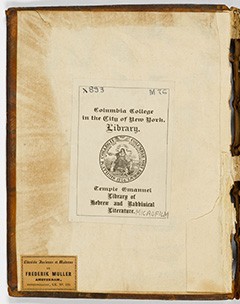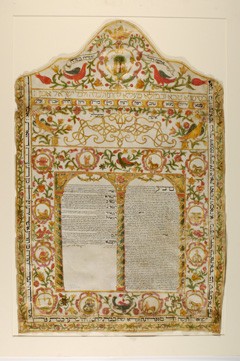History of Jewish Studies Collections at Columbia
Earliest Roots
Columbia’s Judaica collection has always been one of the most important in the country. As early as 1859, Columbia’s collection was listed as third in the country for Hebraica, with 100 volumes. The Union Theological Seminary's collection, which is now part of Columbia, was first on the list with 250.
Nineteenth century donors and library supporters included Jacob Schiff and Oscar Strauss.
Temple Emanu-el and the Beginnings of Judaica at Columbia

The Columbia Judaica collection became truly significant through the generous donation of Temple Emanuel, the oldest Reform congregation in New York City. In 1862, Temple Emanuel purchased 2500 rare books and 45 manuscripts from a rare book dealer in Amsterdam, Fredrich Mueller. This collection was made up of the libraries of important scholars, including Rabbi Yaakov Emden of Altona (1698-1776), the famous Talmudist and Kabbalist, and Guiseppe Almanzi of Padua (1801 – 1860), a bibliophile and poet. The Almzanzi library included books from the library of Hayyim Joseph David Azulai (HIDA, 1724 - 1806), a rabbi and scholar who traveled the world collecting and researching Hebrew rare books and manuscripts. The Almanzi collection was used by the great scholar and bibliographer Morris Steinschneider and Leopold Zunz.
Temple Emanuel purchased this important collection and held it until 1892, when the Rabbi, Gustav Gottheil, convinced the temple board to donate the library to Columbia. According to temple and university documents, the gift was as a token of appreciation for the free tuition which Columbia had begun offering to a number of Jewish students from the newly established Jewish Theological Seminary. It is interesting to note Rabbi Gustav Gottheil’s son, Richard, was the Professor of Rabbinical Literature and the Semitic Languages at Columbia, a position endowed around the same time by Temple Emanuel.
Richard Gottheil bought many manuscripts for the university, and by the end of the 1890s, more than 200 Hebrew manuscripts were added to the original Temple Emanuel collection. In 1896, the New York Times described the Columbia Judaica collection as “the largest in the country.” In 1900, the famed Reform leader Stephen Wise, a Columbia alumnus, donated a collection of 600-700 printed volumes from the collection of his father, Aaron Wise, to the university. In 1906, Gottheil went to France, where he purchased dozens of manuscripts related to southern French Jewry, including 32 mahzorim and thousands of communal and private documents.
Professor Gottheil’s widow donated his personal library to Columbia in 1939 after his death. This consisted of 10,000 volumes, about one third of which were in Hebrew.
Salo Baron's Legacy of Manuscripts

The next phase in the development of Columbia’s Judaica collection began when Salo Baron, the famous Jewish historian, joined the Columbia faculty in 1930. Using funds donated by the Nathan J. Miller family (the same family who endowed his chair in Jewish History), Baron was able to purchase many rare books and manuscripts for the library. In 1933/4, Baron purchased a tremendous collection of manuscripts from David Frankel, a book-dealer in Vienna.
According to the January 4, 1934, New York Times, the collection contained "650 manuscripts in Hebrew characters" and many more in other scripts. Examples from the collection included "prayer books...from Babylon, Baghdad, Greece, Italy, Spain, Turkey, and Yemen," "forty marriage licenses written on vellum," a "collection of writings in...ethics, mysticism, medicine, and natural sciences," and "community books, minutes, registers, private letters and local court decisions from Italy, Turkey, Morocco, Russia and Poland."
According to Columbia’s own Library Columns (v.20, no.3, p.9), the Frankel purchase made the Columbia holdings “the finest collection of Hebrew manuscripts in the United States with the exception of that at the Jewish Theological Seminary.”
Other Important Collections
In 1947, the Libraries received a gift of 3,933 volumes by and about Baruch (Benedict) Spinoza. This gift was formed by a combination of the collections of Adolph S. Oko and Carl Gebhardt and contains material by and about the famous Jewish philosopher. It was purchased and presented to the University by Dr. Simon L. Millner, Mrs. T.W. Lamont, Corliss Lamont, and Mr. E.A. Zabriskie.
In addition to its extensive and important rare book and manuscript collections, RBML also owns the archival papers of many important figures related to Jewish Studies. These include New York senator and governor Herbert H. Lehman; first US ambassador to Israel, James Grover McDonald; World War II activist Varian Fry; New York senator Bella Abzug; Yiddish translator Mirra Ginzburg; author Herman Wouk; and, most recently, Columbia historian Yosef Hayyim Yerushalmi. The Bakhmetoff Archive of Russian Émigrés also includes a number of collections relating to Jewish émigrés. In the early 1990s, the archive of the Language and Culture Atlas of Ashkenazic Jewry was donated to the Rare Book and Manuscript Library, and its data has been digitized and is now available online.
The Present Day: Norman E. Alexander and onward
In 2008, the Norman E. Alexander Foundation made a substantial gift to the Columbia University Libraries to support Judaica collections, both rare and general, as well as a librarian to serve these collections and their users.
Today, there are about 125,000 volumes in the Judaica collection. Our manuscript collection today houses approximately 1700 manuscripts, more than the combined holdings of of the Judaica manuscripts of Harvard, Yale, the University of Pennsylvania, and the Library of Congress.
From its inception, the Judaica collection at Columbia University has been at the top of its class. With the help of the Alexander Foundation and other generous donors, it will continue to be a premier resource in the field of Jewish Studies.